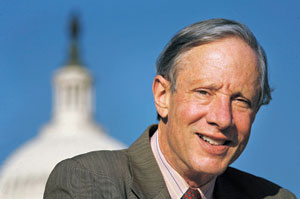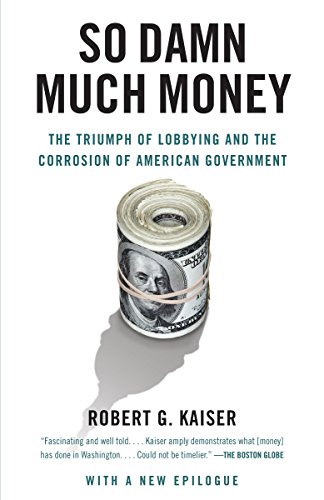So Damn Much Money: The Triumph of Lobbying and the Corrosion of American Government / Robert G. Kaiser
| List Price: | |
Our Price: $17.95 | |
|
For Bulk orders
| |
|
Used Book Price: $1.23 | |
| So Damn Much Money: The Triumph of Lobbying and the Corrosion of American Government / Robert G. Kaiser | |
| Publisher: Vintage | |
| Availability:Usually ships in 24 hours | |
| Sales Rank: 876374 | |
|
Similar Books
The startling story of the monumental growth of lobbying in Washington, D.C., and how it undermines effective government and pollutes our politics.
A true insider, Robert G. Kaiser has monitored American politics for The Washington Post for nearly half a century. In this sometimes shocking and always riveting book, he explains how and why, over the last four decades, Washington became a dysfunctional capital. At the heart of his story is money--money made by special interests using campaign contributions and lobbyists to influence government decisions, and money demanded by congressional candidates to pay for their increasingly expensive campaigns, which can cost a staggering sum. In 1974, the average winning campaign for the Senate cost $437,000; by 2006, that number had grown to $7.92 million. The cost of winning House campaigns grew comparably: $56,500 in 1974, $1.3 million in 2006.
Politicians’ need for money and the willingness, even eagerness, of special interests and lobbyists to provide it explain much of what has gone wrong in Washington. They have created a mutually beneficial, mutually reinforcing relationship between special interests and elected representatives, and they have created a new class in Washington, wealthy lobbyists whose careers often begin in public service. Kaiser shows us how behavior by public officials that was once considered corrupt or improper became commonplace, how special interests became the principal funders of elections, and how our biggest national problems--health care, global warming, and the looming crises of Medicare and Social Security, among others--have been ignored as a result.
Kaiser illuminates this progression through the saga of Gerald S. J. Cassidy, a Jay Gatsby for modern Washington. Cassidy came to Washington in 1969 as an idealistic young lawyer determined to help feed the hungry. Over the course of thirty years, he built one of the city’s largest and most profitable lobbying firms and accumulated a personal fortune of more than $100 million. Cassidy’s story provides an unprecedented view of lobbying from within the belly of the beast.
A timely and tremendously important book that finally explains how Washington really works today, and why it works so badly.
Amazon Exclusive: An Essay by Robert G. Kaiser
 Last fall the House of Representatives set off a sudden collapse of the stock market by voting against the first version of the “bailout” legislation that had been hurriedly written to try to stabilize American banks and other financial institutions. Supporters of the bailout scrambled to change the legislation in ways that would win support for it from a majority of Congressmen. In a matter of days new provisions were added: extension of an excise-tax rebate for makers of Puerto Rican rum (cost to the Treasury, $192 million); extension of a special tax break for the owners of stock car racing tracks (cost, $100 million); a tax break for makers of movies within the borders of the United States (cost over ten years, $478 million) and more. These “sweeteners”--a revealing bit of Washington jargon--did the trick. Days after rejecting the $750 billion bailout, the House approved it.
Last fall the House of Representatives set off a sudden collapse of the stock market by voting against the first version of the “bailout” legislation that had been hurriedly written to try to stabilize American banks and other financial institutions. Supporters of the bailout scrambled to change the legislation in ways that would win support for it from a majority of Congressmen. In a matter of days new provisions were added: extension of an excise-tax rebate for makers of Puerto Rican rum (cost to the Treasury, $192 million); extension of a special tax break for the owners of stock car racing tracks (cost, $100 million); a tax break for makers of movies within the borders of the United States (cost over ten years, $478 million) and more. These “sweeteners”--a revealing bit of Washington jargon--did the trick. Days after rejecting the $750 billion bailout, the House approved it. This dreary sequence was evidence of a fact that careful students of Washington’s ways had realized for some time: In the first decade of the new millennium, the government of the United States was broken. It had taken three decades to create the mess. Democrats and Republicans had collaborated in its creation, and as that story of the sweetening of the bailout bill makes clear, money was at the heart of the problem.
Those sweeteners were payoffs of a kind--spending proposals that would allow the politicians promoting them to boast of their own influence in Washington, hoping to win votes in the process. Spending on the favored projects of Senators and Congressmen had grown exponentially since Republicans took over congress in 1994 and decided that they could defend their majorities if their members could bring home a lot of bacon. Hence the explosion of the legislative provisions called “earmarks” that John McCain assailed in his presidential campaign.
But money became a dominant factor in more insidious ways. Over the 30 years, opinion polls, focus groups and television commercials became the most effective tools to win elections, and all of them were expensive. So were the consultants whom candidates hired to make their commercials, shape their campaigns, even choose the issues they would run on. To win a politician needed a lot of money. Money could elect someone to office who never addressed important matters that affect ordinary Americans’ lives. Money elects candidates who have no real philosophy of governance nor a coherent view of the world. The result has been unreal politics--candidates winning or losing office on the basis of their positions on social issues essentially unrelated to governance, for example.
Not addressing problems has become easy in a political environment distorted by money. In these three decades when money became so important in Washington, Congress lost much of its effectiveness as a governing institution. Running for reelection became more important than running the country, or keeping an eye on the exercise of executive power--the roles the Founders envisioned for the House and Senate. The quality of governance in the United States had declined palpably in these years.
(Photo © Lucian Perkins)
Now you can buy Books online in USA,UK, India and more than 100 countries.
*Terms and Conditions apply
Disclaimer: All product data on this page belongs to
 .
.No guarantees are made as to accuracy of prices and information.










